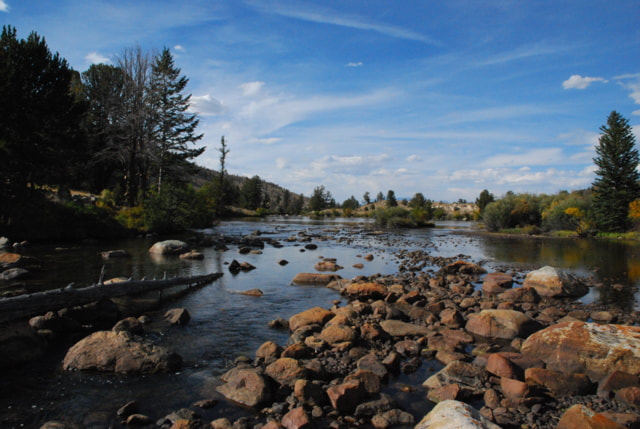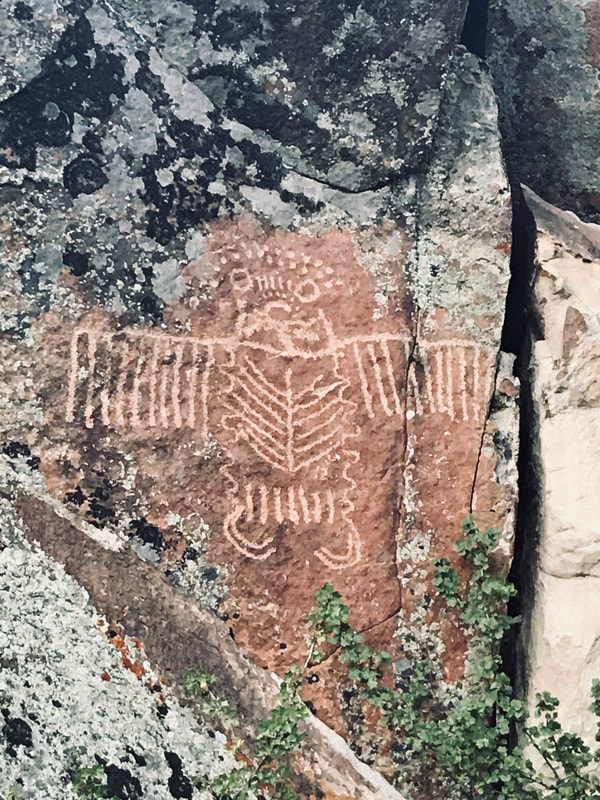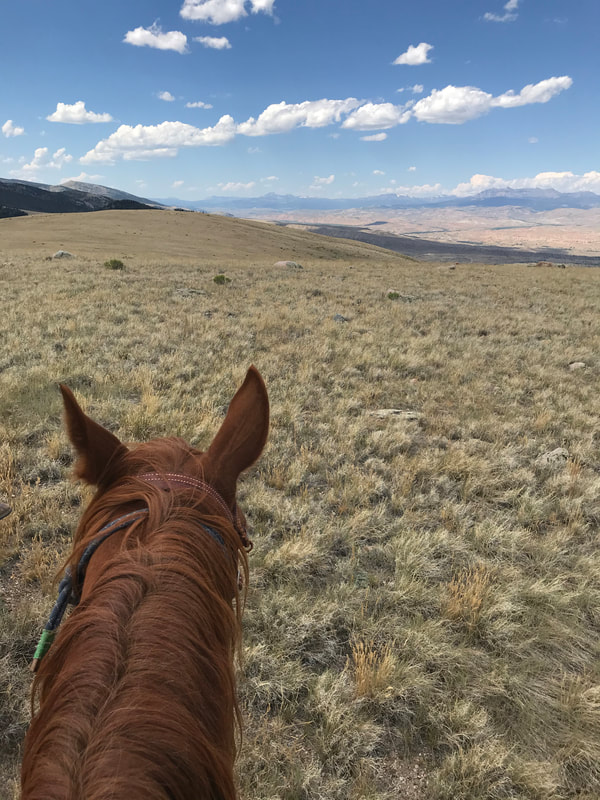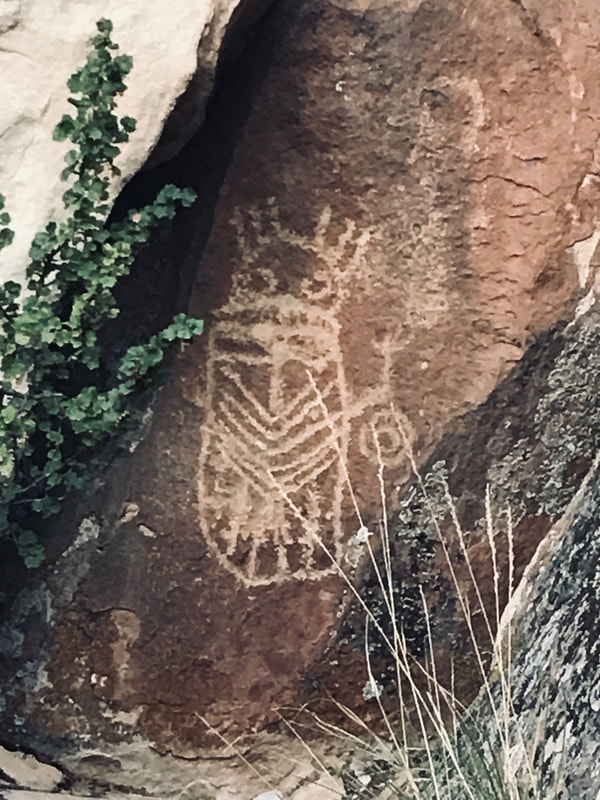|
“No experience exists apart from the story we tell about it.” Gareth Higgins, Ring Lake Ranch, 9/6/21 Last week Hal and I had the privilege to be with author, storyteller, and peacemaker, Gareth Higgins at Ring Lake Ranch, just south of Dubois, WY. Gareth is a native of Northern Ireland and grew up in Belfast during “the Troubles” of the 1980’s and 1990’s before the Peace Accord. By his own admission, he grew up with fear in an evangelical Protestant household that had family ties to Catholic relatives. And he was coming into to the realization that he was gay. He grew up with stories about life that engendered fear as well as with the threat of real danger. Throughout his young adulthood he worked in peacemaking efforts in Ireland and around the world. He became one of the founders of the progressive and post-evangelical Christian Wild Goose Festival in North Carolina where he completed a PhD in sociology and met his husband, Brian Ammons, an Alliance of Baptists (very progressive Baptists) pastor and an educator with his own PhD in education. This is part of the “outside” story of Gareth. We were privileged to learn some of Gareth’s and Brian’s “inside” story – that they are some of the warmest and most welcoming people you could ever meet, funny and full of joy, deep, compassionate listeners, incredible partners in the ministries that each of them has in the world, wise beyond their middle years, and both of them forces for peacemaking, violence reduction, the power of dreams and connection with the earth. Last week was a week of great beauty in the wilderness of the Wind River Range of Wyoming where Ring Lake Ranch is situated in a beautiful valley with three lakes for fishing, many hiking trails and a stable full of horses for riding. I hope you can go there at some point to connect with the earth and to be part of the wonderful conference learning. However, my experience of the Ranch last week was not just centered around Gareth and Brian or the beauty of the setting. My experience was the delight of sinking into a “tribe” of creative people from all over the country eager to ask questions about deepening their faith, passionate about peacemaking in small and big ways in our fractious world, brimming with joy in their experiences of wilderness, and willing to share with vulnerability their personal fears and their fears in this time of pandemic, political division and climate crisis. We learned and laughed and cried and did dishes after each meal together, creating community from a group of people that had never met and would never be in same place together again, community that was precious and taught me about the kin-dom of God’s beloved community. This week I return to work as one of your pastors and to the community of Plymouth. I bring a more rested mind, a more centered heart, and a desire to share with you the story that as fearful as things might be, we, too, can be vulnerable with one another as we create beloved community here in Fort Collins. The pandemic is not over. We are having to pivot daily it seems to create protocols and programming that creatively meets the challenges of keeping folks safe. We are ALL tired and frayed with the stress of this pandemic story we are living, tired of wearing masks that hide our expressive faces, tired of not meeting together in the ways in which we have always been accustomed. We are ALL a bit grumpy and anxious, some more than others – even your pastors! Our patience is waning. We have had a lot of staff change in the midst of one of the hardest years our culture and society has had to endure. And as a community we are facing having to embrace a tragedy in one of our families that most of us have never been confronted by, the incarceration of one of our youth for a violent crime. We are all shaken, unsettled, heartbroken in some way, and perhaps, feel alienated from our community even as we long for its sustenance and nurture. We all feel the fearful loss of control over our lives in large or small ways. And that creates fear inside of us and among us. Fear is uncomfortable, to say the least. Yet, what if we tell a new story about our fears?
A wise and youngish man who continually faces his own fears and who has learned to tell the story of his fears through the lens of love said to Hal and I and the gathered community at Ring Lake Ranch last week, “No experience exists apart from the story we tell about it.” My dear Plymouth, how will we tell, and by telling, create our story of beloved community in these trying, exhausting, yet full of possibility, times? With you on the journey, PS! Join the Adult Forum team the next two Sundays, 9/19 and 26, as they explore with us themes from Gareth Higgins’ book How Not to Be Afraid: Seven Ways to Live when Everything Seems Terrifying! And look for news about possible book study groups of this group coming later in the fall. *Gareth Higgins, How Not to Be Afraid: Seven Ways to Live when Everything Seems Terrifying, (Broadleaf Books, Minneapolis, MN: 2021, 33). Image: J.A. Ferguson
Petroglyphs from the Sheep Eater people and view of the Absaroka Mountains from horseback. Sometimes I think that the Commandment we Americans break with the greatest frequency is observing the sabbath. Honestly, do you set aside a day for rest, regeneration, and focus on your relationship with God? I don’t imagine that more than a partial handful of us at Plymouth actually take a sabbath day each week. Sabbath, of course, is Saturday (hence “Sabado” in Spanish and “sabato” in Italian), and our Jewish siblings observe it thus. Most Christians opt for “The Lord’s Day,” the day of Jesus’ resurrection, as our holy day. Going back as far as the Didache in the 2nd century, believers were to "Gather together each Sunday, break bread and give thanks, first confessing your sins, that your sacrifice may be pure." But sabbath is not just about worship; it also concerns a rhythm for the week. “Six days you shall labor and do all your work. But the seventh day is a sabbath to the Lord your God; you shall not do any work.” (Exodus 20.8) Do you refrain from your professional work, volunteer work, household chores, errands, and so forth on the sabbath, even if you observe it on Sunday? To be sure, that is still the case for schismatic Presbyterians (the “Wee Frees”) in the Hebrides of Scotland, and our Puritan and Pilgrim ancestors in the Congregational tradition also were strict in their observance of sabbath each week. (We still had “blue laws” in Connecticut when I was growing up.) Isn’t it strange that as we developed a strong “Protestant work ethic,” we seem to have let go of sabbath-keeping? I’ve just returned from a week of retreat at Ring Lake Ranch, an ecumenical study center in Wyoming, which has deep associations with Plymouth its members, especially the Petersen-Myerses, the Hoyers, the Schulzes, the Dilles, and others. I was meant to be doing a course with Diana Butler Bass this summer, but all presentations were cancelled due to the coronavirus, but they kept the Ranch open at 50% guest capacity for retreat time. I am really grateful that Plymouth allows for sabbatical (and for having Jane Anne at Ring Lake for part of hers) as well as continuing education time for its pastors. Ring Lake Ranch’s motto is “Renewal in sacred wilderness,” which is spot-on. Both Jane Anne and I had a time of renewal…as did Mark Lee, who was taking a break from his new congregation in South Dakota! I encourage you to try Ring Lake Ranch next summer for some great seminar presenters. (Go to ringlake.org for more info.) The past six months of pandemic have been taxing for all of us…learning to adapt to new ways of worship and being church, working and educating kids from home, resisting the urge to hug or even shake hands with our friends. And it has taken a toll on many of us: on our social, psychological, and spiritual lives. (Racial crises and desperate presidential politics don’t help our sense of well-being, either.) So, how do we find resilience in the midst of this marathon that we hoped would end with the first sprint? Sabbath may be the part of the answer. If you can find a way to carve out and set apart a time each week or get away for a few nights of camping or a trip to the mountains, I endorse that as a pastoral recommendation. Thomas Keating used to describe prayer time as “a hot date with God,” and I commend to you some time of contemplative restoration of your soul, whether in the wilderness or in your backyard. May you be blessed by the discovery of inner strength and faith this week. Shabbat shalom! AuthorThe Rev. Hal Chorpenning has been Plymouth's senior minister since 2002. Before that, he was associate conference minister with the Connecticut Conference of the UCC. A grant from the Lilly Endowment enabled him to study Celtic Christianity in the UK and Ireland. Prior to ordained ministry, Hal had a business in corporate communications. Read more about Hal. |
Details
|






 RSS Feed
RSS Feed